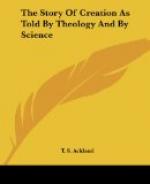At the time of the Exodus, it seems clear that, even
among a people so far advanced as the Egyptians, all
that lay beyond the mountains which bounded their
land on the west was believed to belong not to living
men, but to disembodied spirits. It was the terrible
country through which the souls of the departed made
their arduous way to the Hall of Judgment [Footnote:
“The Nations Around,” pp. 49, 50.] Accordingly,
we find that the Egyptians made no attempt to extend
the limits of their empire in this direction, while
the monarchs of the Mesopotamian region seem to have
been equally unambitious of conquest beyond the mountain
ranges which bounded the valley of the Tigris on the
east. Mesopotamia, then, on the east, Egypt on
the west, Armenia and Asia Minor on the north, and
Arabia on the south, seem, in the view of the contemporaries
of Moses, to have been the utmost regions of the world.
Ignorant as they were of any countries beyond these,
they were, of course, equally ignorant of the numberless
varieties of plants and animals that were to be found
in them, and with which we are familiar. Mining
was not unknown, but the mines were few and superficial;
they could not reveal much of the structure of the
earth, and what little they did reveal passed unnoticed.
Nothing was known of the successive beds of rock which
form the crust of the earth, of the fossils with which
they abound, or of the gradual changes to Which they
are still subject. If any one had told the men
of that generation that the solid earth on which they
stood, or the everlasting hills which surrounded them,
were undergoing slow but steady modifications, he
would have been looked upon as a madman.
A revelation, then, addressed to men whose language,
whose intellectual powers, and whose stock of ideas
were thus limited, must of itself also necessarily
have been both limited and destitute of precision.
It could only deal with things with which they had
some acquaintance, or of which they could form some
idea, while, from the character of the language, and
the extreme brevity of the record, the treatment of
even these few subjects must have been of a vague
and indefinite character. Traces of a deeper
knowledge there might be, but they would not lie upon
the surface. They must be carefully sought for,
and then they would be discernible only by those who
were in possession of the key which would unlock their
hidden secrets.
Such are the limitations under which the revelation
was necessarily given. We have now to consider
our own especial difficulties, the obstacles which
stand in our way when we would discover for ourselves
all the information which the record is capable of
conveying. For if this record be, as we believe,
the work of the Great Architect of the Universe, then
it is probable that its every detail is significant;
that wherever it was possible words were chosen which,
when scrutinized, would convey much more information
than appeared on the surface. The great problem
for us to solve is, What are the difficulties which
stand in our way when we would seek this knowledge,
and what are the means by which those difficulties
may be surmounted, and the hidden treasure displayed?




